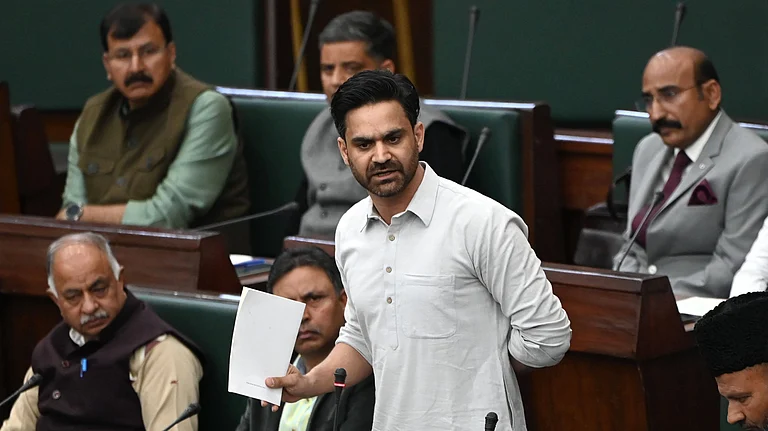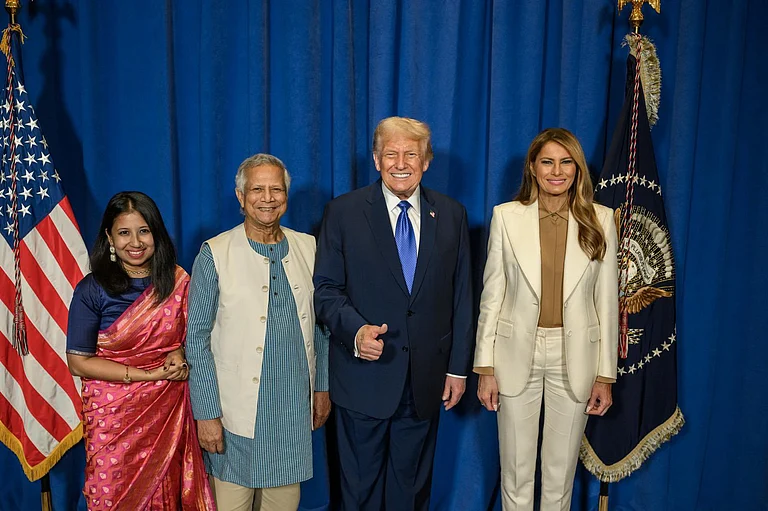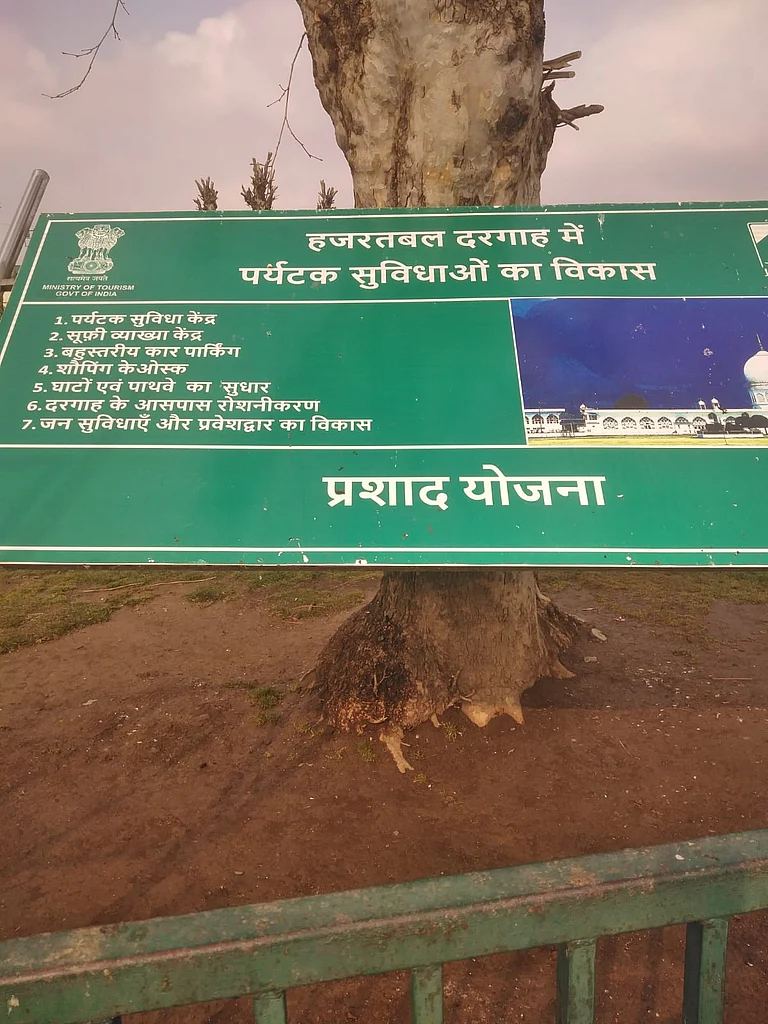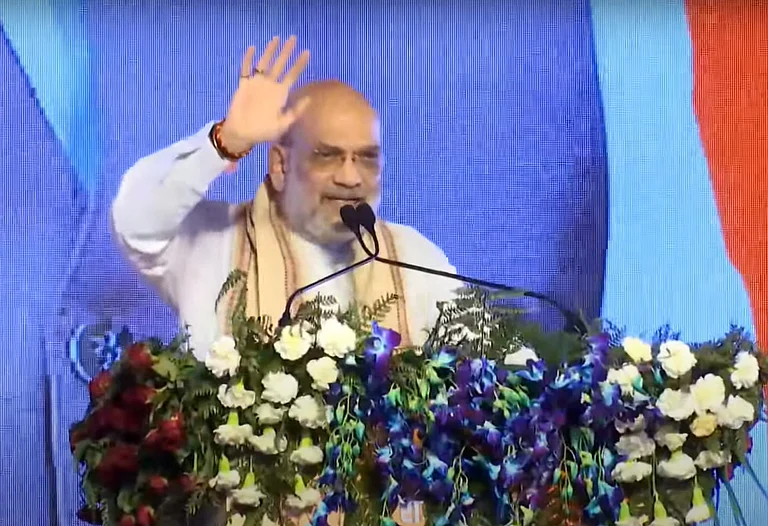Three former members of the banned Jamaat-e-Islami on Tuesday filed nominations for the Assembly elections in Jammu and Kashmir scheduled next month -- a move that is being seen as an ideological shift in the politics of the region.
However, for Talaat Majeed, there is nothing unusual in it. Majeed, a former Jamaat member, has filed his nomination papers as an independent candidate from the Pulwama constituency. He hails from Goripora village in Pulwama, South Kashmir.
Speaking to Outlook, he said his participation and the Jamaat-e-Islami's willingness to involve itself in elections was a major development but not unusual.
“It’s not unusual for Jamaat-e-Islami or its former members to participate in elections. We’ve been part of the democratic process since 1950. When the National Conference boycotted elections, we participated. Jamaat stayed away only after the 1987 election rigging,” Majeed said.
He added that the 1987 election “was the root cause of every ill in Kashmir”.
Majeed, who completed his MSc in 2002 from the University of Kashmir, joined Jamaat-e-Islami at that time and remained with the organisation until 2014. He also worked in the Agriculture Department and pursued a PhD, which he completed in 2012. He quit his government job in 2023 to focus on his political career.
“Since 2010, I’ve argued within Jamaat for getting involved in mainstream politics. In 2014, I urged the party to reconsider its stance and join mainstream politics,” he said, adding that Jamaat has only recently acknowledged the need for mainstream politics.
“It took Jamaat ten years to realise that mainstream politics has no alternative. What I was saying in 2014 they are now concurring to in 2024,” he said.
Founded in 1942 by Maulana Saad-u-Din, Jamaat-e-Islami Jammu and Kashmir separated from Jamaat-e-Islami Hind in 1953. The organisation seeks resolution of the Kashmir issue through self-determination.
In March 2019, after the government’s ban on Jamaat-e-Islami, many of its members went into hiding. The crackdown, initiated on February 28, 2019, led to arrests and the sealing of properties. The Home Ministry declared Jamaat-e-Islami an “unlawful association” under Section 3 of the Unlawful Activities (Prevention) Act, citing its activities as a threat to national security and public order.
The Unlawful Activities (Prevention) Tribunal last week upheld the Home Ministry's decision to ban Jamaat-e-Islami Jammu and Kashmir. The ban, initially set for five years from February 28, 2019, was extended for another five years in February 2024.
Majeed says Jamaat has distanced itself from armed militancy since 1997 and has avoided agitation politics. “In 1997, Jamaat explicitly stated it had no links with militancy or armed groups,” he says.
In 1990, the Hizbul Mujahideen had claimed to be Jamaat-e-Islami's military wing. “Jamaat did not bring guns to J&K in 1990. After 1990, hardliners gained influence within Jamaat, and Jamaat was blamed for many things. But I must tell you, most organisations, mainstream and religious, in J&K, had armed wings in Kashmir in the 1990s. Jamaat is being only targeted,” he says.
“Over 3,200 Jamaat Rukuns (basic members) were killed. We are the victims, but others have portrayed us as perpetrators,” he adds.
Asked if Jamaat joining the mainstream would be an ideological victory for the BJP, Majeed says, “Mainstream parties have long used the ghost of Jamaat to threaten New Delhi. They knew how to sell the story of Jamaat to Delhi. It’s always the hunters telling the story of the hunted, but now it is time for our own story.” Negotiations are on between the Centre and the Jamaat over lifting the ban.
Meanwhile, different political parties have reacted differently to the development.
Former Chief Minister of Jammu and Kashmir and vice president of the National Conference, Omar Abdullah, labelled Jamaat-e-Islami’s decision to contest the upcoming assembly elections as a significant development but also took a sarcastic view of it. He said the Jamaat-e-Islami, which had previously deemed elections as “haram” and spent over three decades urging Kashmiris to boycott elections and reject India was now willing to take the same constitutional oath as mainstream political parties. He, however, said he hoped the ban on Jamaat-e-Islami would be lifted so the party could contest under its own symbol. He said that Jamaat-e-Islami should be permitted to contest as Independents.
Majeed dismissed Omar’s views and said, “Everything boils down to the 1987 election. You talk about Jamaat, you should also talk about 1987.”
He concurred with the views of the People's Conference’s Sajjad Gani Lone. Lone tweeted that he was extremely pleased if the news of some individuals affiliated with Jamaat contesting elections was true.
“Jamaat have coexisted in the mainstream political space prior to 1989. We rarely agreed politically and often fought each other bitterly in elections. Ideologically, there was never an overlap. Many of their prominent leaders spent years in jail, often sharing cells with my late father. Today, we will be contesting against them on the ground once again. But despite our political differences, I am glad that a party which has truly struggled will be participating in the elections,” Lone said.


























